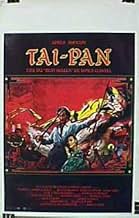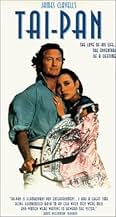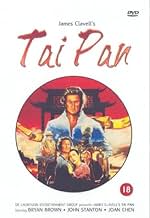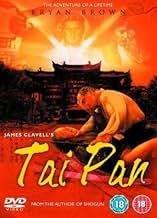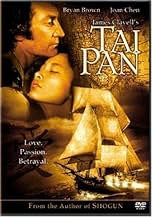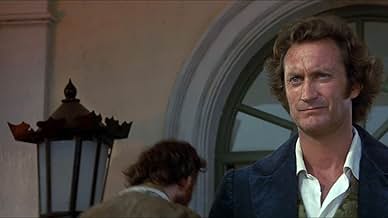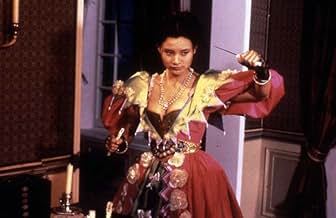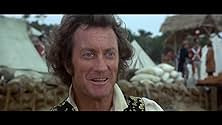AVALIAÇÃO DA IMDb
5,6/10
2 mil
SUA AVALIAÇÃO
Adicionar um enredo no seu idiomaHistorical fiction set against the backdrop of Hong Kong in its early years of British rule.Historical fiction set against the backdrop of Hong Kong in its early years of British rule.Historical fiction set against the backdrop of Hong Kong in its early years of British rule.
- Direção
- Roteiristas
- Artistas
- Prêmios
- 2 indicações no total
- Direção
- Roteiristas
- Elenco e equipe completos
- Produção, bilheteria e muito mais no IMDbPro
Avaliações em destaque
Last night on Turner Classic Movies, I saw a trailer from the sixties called "Lion Power" about all the big projects audiences could expect from MGM in the months and years ahead. Included among them were clips from "Far From the Madding Crowd" and "Where Were You When the Lights Went Out?", plus mention of "Where Eagles Dare" with Richard Burton (not mentioning Clint Eastwood, as perhaps he wasn't signed yet), "Ice Station Zebra", and "2001: A Space Odyssey" with very early-form artwork of its making. Among the many films mentioned in passing near the end of the trailer was "James Clavell's 'Tai-Pan'", yet no earlier version of the film was ever made. Just how long was this thing in the making, and what casts were potentially involved at different times? It would be interesting to see the planned history of such a movie that took so long to finally get made, bad as it reportedly is.
Mediocre rendition about James Clavell's novel, deemed to be first American production shot in China
Very average epic about the birth of the Hong Kong colony , being and overerblown and lousily paced retelling . A disjointed mess set in 19th Century when a powerful lord has to escape from Canton due to "Opium War" and to go a coastal location to be founded the city of Hong Kong . The chief trader , Tai Pan: Bryan Brown , dreams of establishing a colony of commerce to be callled Hong Kong and , eventually , he gets it .
This in an inferior, pretentious epic , whose basis for the film is the James Clavell's novel of the same name, regarding some very free historic events about the origin of the Hong Kong colony, including some really ludricous characters . As a Scottish trader : Bryan Brown and his beautiful mistress : Joan Chen are the main roles in this confusing attempt to dramatize the story of Hong Kong's foundation and development into an important trading port . Along the way the principal plot is mingled with loving conflicts , personal vengeances and ambition for possession of Hong Kong port . It packs love stories , violent confrontation , fights , brief nudism and anything else . The film goes wrong due to too many subplots and roles are badly introduced in a short time to do justice to the much better novel ; Tai Pan . This mixed bag plays like a TV miniseries chopped from seven hours to two . Along with main starring : Bryan Brown, Joan Chen , appearing familiar faces as newcomers : Tim Guinee, Janine Turner , Kyra Sedgwick and veteran support cast as Bert Remsen and John Stanton .
Here stands out the moving and spectacular musical score by the great John Barry, as well as colorful cinematography by prestigious cameraman Jack Cardiff . Shot on location in Hong Kong and considred to be the first American production completely filmed in China . The motion picture was regularly directed by Daryl Duke and it failed totally in the world box office , in spite of the big budget financed by Raffaela de Laurentiis , Dino's daughter. Daryl Duke was a craftsman who usually directed episodes of notorious TV series and occassionally made some movies as "I heard the Owl call my name" , " Payday" , "President's plane is missing" , "Silent Partner" and " The Thornbirds", among others . Rating 4.5/10 , a middlingly made movie .
This in an inferior, pretentious epic , whose basis for the film is the James Clavell's novel of the same name, regarding some very free historic events about the origin of the Hong Kong colony, including some really ludricous characters . As a Scottish trader : Bryan Brown and his beautiful mistress : Joan Chen are the main roles in this confusing attempt to dramatize the story of Hong Kong's foundation and development into an important trading port . Along the way the principal plot is mingled with loving conflicts , personal vengeances and ambition for possession of Hong Kong port . It packs love stories , violent confrontation , fights , brief nudism and anything else . The film goes wrong due to too many subplots and roles are badly introduced in a short time to do justice to the much better novel ; Tai Pan . This mixed bag plays like a TV miniseries chopped from seven hours to two . Along with main starring : Bryan Brown, Joan Chen , appearing familiar faces as newcomers : Tim Guinee, Janine Turner , Kyra Sedgwick and veteran support cast as Bert Remsen and John Stanton .
Here stands out the moving and spectacular musical score by the great John Barry, as well as colorful cinematography by prestigious cameraman Jack Cardiff . Shot on location in Hong Kong and considred to be the first American production completely filmed in China . The motion picture was regularly directed by Daryl Duke and it failed totally in the world box office , in spite of the big budget financed by Raffaela de Laurentiis , Dino's daughter. Daryl Duke was a craftsman who usually directed episodes of notorious TV series and occassionally made some movies as "I heard the Owl call my name" , " Payday" , "President's plane is missing" , "Silent Partner" and " The Thornbirds", among others . Rating 4.5/10 , a middlingly made movie .
Tai-Pan was probably too ambitious an undertaking for a film as short as just over 2 hours. Maybe a mini-series would have been the answer, but Tai-Pan certainly had the potential to be an oriental Gone With The Wind.
Unrealized potential though it is. The screenplay made many references to previous events in the novel that are not shown here. We do know there's one nasty rivalry going on between Bryan Brown and John Stanton who both rose to wealth in the China trade like the protagonists in an Edna Ferber novel.
Bryan Brown is the Far East version of Rhett Butler. He's built the family fortune on legal trade and illegal trade in opium. Not that opium was unknown before the British and other European powers got there, but they did turn it into a thriving business. When the Chinese government objected, the European powers took nibbles out of a prostrate and weakened state.
One of those nibbles the British took was Hong Kong, spoils from the Opium War of 1841. Brown like Margaret Mitchell's Rhett Butler or the hero of many Edna Ferber books is the guy who builds what became one of the busiest trading centers on the globe.
Unlike his rival Stanton, Brown's wife left him and took their small son back to the United Kingdom. Brown didn't mourn he took up with some Chinese women, they were pawns in various business negotiations. He got a son, Russell Wong, from one of them.
Things get interesting when his other son arrives from Great Britain played by Tim Guinee. He's a rather uptight Victorian youth who is not pleased with the debauchery he finds and his father's part in it.
Tai-Pan is exquisitely photographed with the climatic typhoon scene very well done indeed. A better screenplay would have been needed to tell this epic story.
Unrealized potential though it is. The screenplay made many references to previous events in the novel that are not shown here. We do know there's one nasty rivalry going on between Bryan Brown and John Stanton who both rose to wealth in the China trade like the protagonists in an Edna Ferber novel.
Bryan Brown is the Far East version of Rhett Butler. He's built the family fortune on legal trade and illegal trade in opium. Not that opium was unknown before the British and other European powers got there, but they did turn it into a thriving business. When the Chinese government objected, the European powers took nibbles out of a prostrate and weakened state.
One of those nibbles the British took was Hong Kong, spoils from the Opium War of 1841. Brown like Margaret Mitchell's Rhett Butler or the hero of many Edna Ferber books is the guy who builds what became one of the busiest trading centers on the globe.
Unlike his rival Stanton, Brown's wife left him and took their small son back to the United Kingdom. Brown didn't mourn he took up with some Chinese women, they were pawns in various business negotiations. He got a son, Russell Wong, from one of them.
Things get interesting when his other son arrives from Great Britain played by Tim Guinee. He's a rather uptight Victorian youth who is not pleased with the debauchery he finds and his father's part in it.
Tai-Pan is exquisitely photographed with the climatic typhoon scene very well done indeed. A better screenplay would have been needed to tell this epic story.
It's worth pointing out that I came to this film having read James Clavell's excellent novel, TAI-PAN, on which this is based. If I hadn't read the book beforehand, I probably would have enjoyed this adaptation a lot more.
Sadly, I was left feeling that the filmed TAI-PAN is a crushing disappointment, purely because it cuts so very much out of the story. The whole background is missing, the Triad stuff, the politics, the trade with the Chinese. The story is reduced to the human relationships and particularly the family rivalries between the main characters, but there was so much more to it than that.
I do understand that films are very different to books and that adaptations have to cut material out, but TAI-PAN has a two hour running time and a lot of it is slow-paced. If it had told events at a much faster pace, it would have been able to include a lot more of the details and subtleties that are missing here. As it is, there are elements of greatness - plus the novelty of seeing Bryan Brown in a leading role - but it could have been so much more. A miniseries would suffice better, I think.
Sadly, I was left feeling that the filmed TAI-PAN is a crushing disappointment, purely because it cuts so very much out of the story. The whole background is missing, the Triad stuff, the politics, the trade with the Chinese. The story is reduced to the human relationships and particularly the family rivalries between the main characters, but there was so much more to it than that.
I do understand that films are very different to books and that adaptations have to cut material out, but TAI-PAN has a two hour running time and a lot of it is slow-paced. If it had told events at a much faster pace, it would have been able to include a lot more of the details and subtleties that are missing here. As it is, there are elements of greatness - plus the novelty of seeing Bryan Brown in a leading role - but it could have been so much more. A miniseries would suffice better, I think.
I agree with other comments that this should have been a miniseries but on HBO not commercial TV. The scenes with the various women would have been destroyed with censorship. I believe that it did give an accurate "feel" to the times and events depicted.
Upon viewing this I immediately ordered the book ( I had ignored it due to some disappointment at Nobel House ). Also bit the bullet and ordered Shogun the miniseries. Mr. Clavell's work s are to be appreciated even in movies that fall short. I do wish Bryan Brown had a better accent but Joan Chen mimicked it perfectly.
The supporting cast both western and oriental were excellent. Also the "few" ships used were great. Now I want Noble House on DVD.
Upon viewing this I immediately ordered the book ( I had ignored it due to some disappointment at Nobel House ). Also bit the bullet and ordered Shogun the miniseries. Mr. Clavell's work s are to be appreciated even in movies that fall short. I do wish Bryan Brown had a better accent but Joan Chen mimicked it perfectly.
The supporting cast both western and oriental were excellent. Also the "few" ships used were great. Now I want Noble House on DVD.
Você sabia?
- CuriosidadesProducer Martin Ransohoff and the Metro-Goldwyn-Mayer studio in 1966 acquired the rights to James Clavell's source "Tai-Pan" novel for US $500,000. The movie was then announced by MGM in 1967-68 to star Patrick McGoohan to play Dirk Struan, to be directed by Michael Anderson, with source novelist Clavell writing the screenplay. The picture was originally budgeted to cost US $26 million which was then reduced to US $20 million. The project sat around stagnant for a time in development hell. However, after severe operating losses, the epic was one of a number of expensive projects the new management at the MGM studio dropped as being too costly. The project and the development of the movie at MGM was in the end canceled by executive James T. Aubrey.
- Erros de gravaçãoIn a scene, set in 1841, several of the ladies were wearing bright mauve outfits. That would have been most unlikely for the wives of middle class traders at that time as the color purple was prohibitively expensive before the invention of analine dyes in London - in 1856. By 1870 these gaudy colors had become so cheap and commonplace that it became a status symbol to mimic the subtler, paler colors of the pre analine dye days.
- Citações
Dirk Struan: No emperor has seen the guns of a British man-of-war.
Principais escolhas
Faça login para avaliar e ver a lista de recomendações personalizadas
- How long is Tai-Pan?Fornecido pela Alexa
Detalhes
- Data de lançamento
- País de origem
- Idioma
- Também conhecido como
- A Conquista de um Império
- Locações de filme
- Chen Family Temple - Guangzhou, China(Commissioner Lin's court)
- Empresa de produção
- Consulte mais créditos da empresa na IMDbPro
Bilheteria
- Orçamento
- US$ 25.000.000 (estimativa)
- Faturamento bruto nos EUA e Canadá
- US$ 4.007.250
- Fim de semana de estreia nos EUA e Canadá
- US$ 1.863.469
- 9 de nov. de 1986
- Faturamento bruto mundial
- US$ 4.007.250
- Tempo de duração2 horas 7 minutos
- Mixagem de som
- Proporção
- 2.35 : 1
Contribua para esta página
Sugerir uma alteração ou adicionar conteúdo ausente


